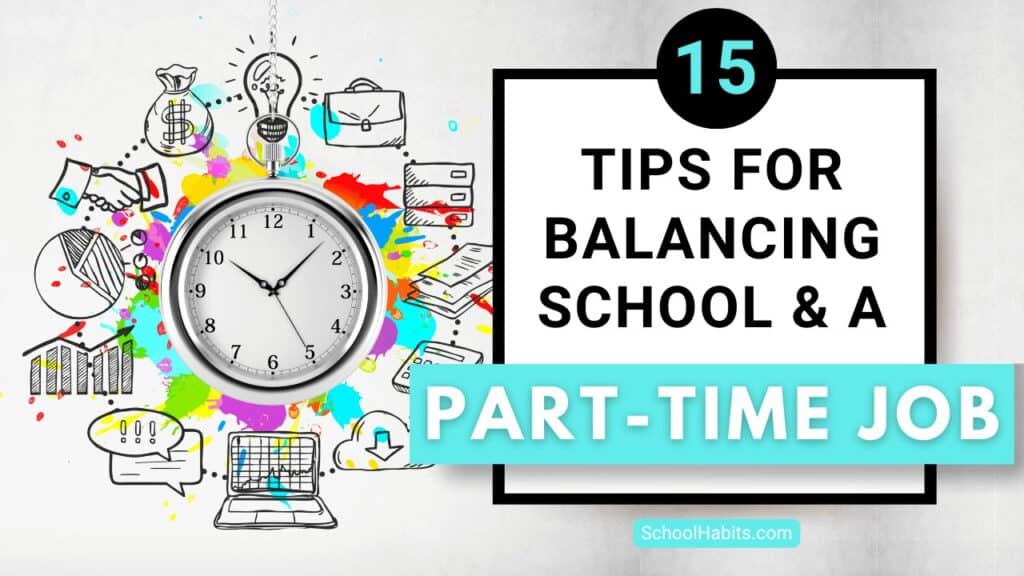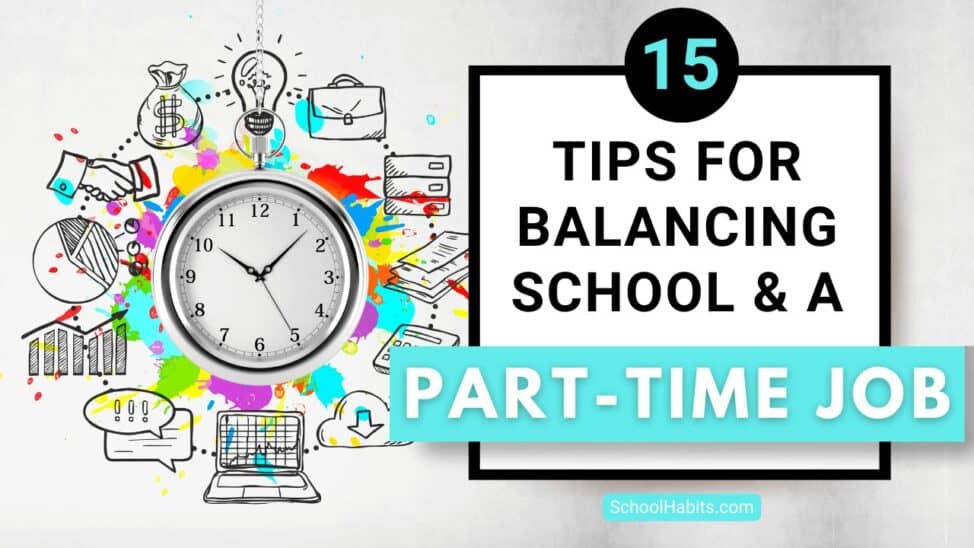By Katie Azevedo, M.Ed.

There are many reasons to work at a part-time job as a student, which I explore more down below. But balancing school and a part-time job as a student is not easy, and all pros and cons should be considered before choosing to add a job to your plate. This blog post offers 15 tips for balancing school and a part-time job in a way that’s not overwhelming, and actually … dare I say … enjoyable?
Reasons to have a part-time job as a student
You may choose to get a part-time job while you’re in school, for any number of reasons. The following list contains some reasons why you might consider working while being a student:
- You need the money to support yourself or others
- You want money for non-essential personal expenses
- You’re working as part of a tuition reduction program
- You want to build your skill set to enhance your college applications
- You want to build your skill set for a job after college
- You want to experiment in various fields before you commit to an academic or professional path
- You’re looking to build network connections
Tips for balancing school and a part-time job
The following 15 tips can help you balance the demands of school while working 25 hours or less per week in a way that feels manageable and not overwhelming. If you’re in graduate school, I want you to read my post about study tips for grad students. If you’re an adult student who’s also working full-time, be sure you’re using these 5 work productivity tips for students with jobs.
1. Have clear boundaries about what hours you can handle
Before you commit to a part-time job, know how many hours you can handle, on what days you can work, and any recurring weekly or monthly conflicts. When you’re communicating with a potential employer, be clear from the beginning about how much you are able to work.
2. Communicate clearly with your boss
Maintaining clear and open communication with your boss is essential to balancing work with school. Speak up when something isn’t working, ask questions when you’re unclear about what’s expected of you, and be honest at all times.
3. Commit to weekly planning
I suggest balancing your school and work schedule week to week, ideally on Sundays. While you should know your work schedule a month in advance (see tip 4), your school schedule will fluctuate depending on your afterschool activities, what tests you have that week (and therefore how much you need to study) and your homework load.
Once a week on Sundays, sit down and plan out on paper what your week ahead looks like. Consider your school hours, work hours, after-school activities, appointments and homework. Here’s my tutorial that shows you exactly how to do this.
4. Get your work schedule a month in advance
Ask your boss if you can get your work hours one month in advance. Bosses who hire students are used to doing this, so asking is no big deal. Getting your work schedule a month in advance can help you plan out your weeks, which is key to staying balanced.
5. Plan work around school, not the other way around
Before you agree to your work hours each month, or before you agree to cover someone’s shift as a favor, make sure that you’re not cutting into time you need for school. You should know exactly what time you’ve scheduled for school if you follow my advice about weekly planning (tip 4). Taking on extra hours might seem like a good idea in the moment, but it’s not worth it if you’re going to be stressed out later on.
6. Work less during exam seasons
Balancing school and a part-time job is not a one-and-done task; you have to make adjustments to your work schedule as your school life enters busy seasons (see the tip above). To keep yourself from feeling overwhelmed, scale back on work hours during midterms and final exams. Just be sure to give your boss advance notice.
7. Cut back on other activities (you can’t do it all)
If you’re going to commit to a part-time job while you’re in school, you may not be able to participate in any other after-school activities like sports and student groups. This isn’t necessarily a bad thing, but it’s something to consider as you think about your college application or your professional resume. There’s only so much time in the day, and you have to remember you can’t do it all. Here are 4 signs you’re doing too much.
8. Avoid procrastination and start things right away
Working students have less free time than students who don’t work. This means that if you have a part-time job, you can’t mess around and put off assignments. Procrastinating is going to lead to nothing but stress, which can impact both your grades and your job. The solution is to start assignments far sooner than you want to – and that includes studying for tests. Here are some of my anti-procrastination tips.
9. Find a study space near your job
Scope out an off-site study space that’s near where you work. This could be a library, coffee shop, bookstore, or something similar. The reason I’m including this as a tip for balancing school and a part-time job is that there could be days when it just makes sense – time-wise – to get your homework done before or after work, near work. Whether due to traffic, your ride situation, or any other factors, it’s good to have an alternative study location in your back pocket.
10. Work ahead whenever you can
Tip 9 is to avoid procrastination, but the real balancing magic comes when you can work ahead. Sure, there will be days when you can hardly manage the bare minimum, but there will also be days when you’re not scheduled to work and your homework load is light: these are the days you should be working ahead.
For example, if your teacher has only assigned chapter 5 in the novel you’re reading, go ahead and read the next chapter as well (because you know you’re going to have to eventually). Or maybe your teacher hasn’t yet told you when your vocab quiz is, but you can start studying anyway because you know it’s coming up at some point.
11. Start small – evaluate – and then add more hours if you can handle it
If you’re excited by the idea of earning money with a part-time job, especially if it’s your first job, I understand the temptation to “go all in” and take as many hours as you can. More money, yes. But also more stress and more juggling time.
Note: Curious about grad school and wondering if it’s worth it? Read my tutorial titled “Should You Go to Graduate School?” for some clarity.
I suggest you start with minimal work hours – probably lower than you think is reasonable – and then evaluate how well (or not well) you’re able to balance school and work for about a month. After a month, consider whether it makes sense to increase your work hours.
While you’re at it, make sure you don’t fall into one of the top three time-wasting traps students make.
12. Save your money wisely
If you spend every penny you earn, you’ll have to keep working more to replenish your bank account. But if you are mindful about your spending and you save your money wisely (many financial experts like this one argue that students should save at least 20% of their paychecks), you will be able to keep your work hours reasonable.
13. Study efficiently using active recall (this saves time!)
When you’re balancing school and a part-time job, you have to be ultra efficient with how you study. With so little free time, you won’t be able to study longer, but you can study better. How? Use active recall techniques instead of passive study techniques. Active recall is definitely more uncomfortable, but that’s because it works. And because it works, you can study for less time. On the other hand, passive study methods (like re-reading notes) might feel more comfortable in the moment, but they don’t work and they waste valuable time.
14. Choose a job that’s easy to get to and isn’t affected by traffic
This may seem like a no-brainer, but the easier your job is to get to, the easier it will be to balance. Also consider what the traffic is like at peak commuting times. A job might pay well, but if it has a 45 minute commute each way, that’s 90 minutes you could spend doing something more valuable.
15. Choose a job with flexibility
This may be another no-brainer tip, but you’re going to be able to balance school and work easier if you have a job (and a boss) that’s flexible. A slightly higher paying job at the same place your friend works might sound cool, but if the manager doesn’t accommodate your school schedule or make allowances for your hockey play-off season, you might be better off taking the lesser-paying job scooping ice cream.
A final note to working students
As I’ve written above, getting a part-time job while you’re in school has many benefits beyond the paycheck, including developing skills, making connections, and building out your resume and applications.
However, sometimes even all the time management strategies in the world – including the 15 tips for balancing school and a part-time job in this post – might not be enough to help you balance a job that’s too much no matter how you spin it. If you’re chronically stressed out, missing assignments, and showing up late to school or work, you might have to consider taking a break from your job until things settle down a bit. This is not a failure: it’s self-awareness.

